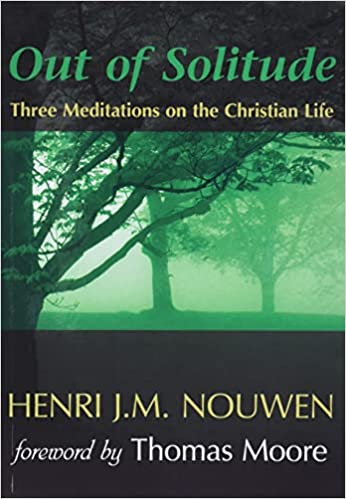A 1997 silent retreat at a Jesuit retreat center in Atlanta was transforming for me. In those two days, the Holy Spirit impressed on me in a new and powerful way the fact of my Father’s unconditional love for me.
Like many pastors, my self-esteem was largely centered in my ministerial performance. When our church is thriving and people seem to benefit from our work, we pastors feel successful. We become who we believe our members believe us to be, always living from one Sunday to the next, one ministry engagement to the next opportunity or need.
During that 1997 retreat, the Spirit especially used Nouwen’s small book of meditations, Out of Solitude, to speak deeply to my hunger for transforming significance.
“By myself I can do nothing”
Yesterday, I sensed the Spirit’s prompting to read Nouwen’s book again. His emphasis in the introduction struck me as it did twenty-five years ago: “In the lonely place, Jesus finds the courage to follow God’s will and not his own; to speak God’s word and not his own; to do God’s work and not his own.”
Nouwen then quotes Jesus’ testimony, “By myself I can do nothing . . . I seek to do not my own will but the will of him who sent me” (John 5:30). And John 14:10, “It is the Father, living in me, who is doing his works.”
At that retreat so many years ago, reading these very words, I realized in a new way that if Jesus could do “nothing” by himself, how much more do I need to depend on my Father’s power and purpose? If it was the Father “doing his works” through his Son, how much more do I need him to work through me?
“A nearly diabolic chain”
Nouwen’s brilliant psychological insights shine throughout the book. This observation was especially noteworthy as I reread his book:
“The more we allow our accomplishments—the results of our actions—to become the criteria of our self-esteem, the more we are going to walk on our mental and spiritual toes, never sure if we will be able to live up to the expectations which we created by our last successes. In many people’s lives, there is a nearly diabolic chain in which their anxieties grow according to their successes. This dark power has driven many of the greatest artists into self-destruction.”
In other words, the more we succeed, the more we are driven to succeed and the more fearful we become of failure. What a prescription for burnout and worse.
“They had no money to pay a chaplain”
Nouwen also warns of the temptation to turn to “professionals” for the help our souls need to receive and to give. He tells a story from America’s constitutional convention in 1787:
“When the discussions did not seem to get anywhere, Benjamin Franklin proposed to open the sessions with prayer. But the delegation to the convention rejected the proposal not because they did not believe in prayer but because they had no money to pay a chaplain” (S. E. Morrison, The Oxford History of the American People).
Nouwen comments: “Although it is usually very meaningful to call on outside help, sometimes our referral to others is more a sign of fear to face the pain than a sign of care, and in that case we keep our greatest gift to heal hidden from each other.”
As a result, “By the honest recognition and confession of our human sameness we can participate in the care of the God who came, not to the powerful but to the powerless, not to be different but to be the same, not to take our pain away but to share it. Through this participation, we can open our hearts to each other and form a new community.”
Conclusion
Nouwen’s classic call to an authentic spiritual life is as relevant as when I first read it a quarter-century ago. If you and I depend on the indwelling power of the Spirit rather than the acclaim of others, we can be vulnerable with God and others in ways that build a “new community” of transforming compassion.
Jesus could testify, “It is the Father, living in me, who is doing his works.”
Can you say the same today?




